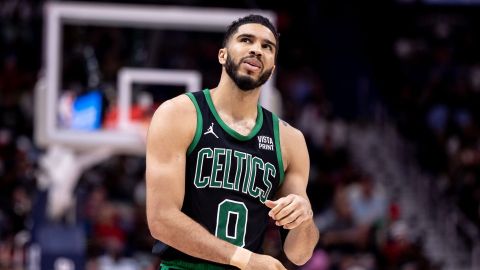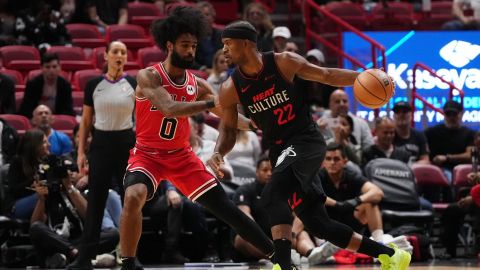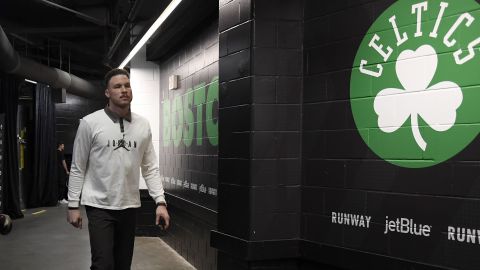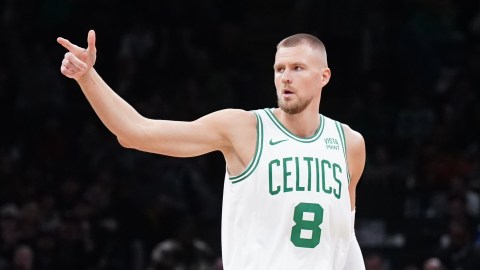 Derrick Williams curled around a screen by Nikola Pekovic, received a pass from Kevin Martin and glided in for a layup. Williams’ defender, struggling to recover after receiving no hedge help from his teammate, belatedly fouled the young forward for an and-one opportunity.
Derrick Williams curled around a screen by Nikola Pekovic, received a pass from Kevin Martin and glided in for a layup. Williams’ defender, struggling to recover after receiving no hedge help from his teammate, belatedly fouled the young forward for an and-one opportunity.
That was how the Timberwolves’ first play unfolded against the Celtics on Sunday, with a sign of just how dangerous Williams could be by moving without the ball. Yet after that effective opening play, Williams generated basically no other offense for the rest of the night. He finished with just five points, reminding everyone why the Wolves have been looking to get rid of him less than three years after taking him with the second overall pick in the 2011 draft.
Like many players, Williams’ problem is not one of natural ability. Since his days at La Mirada High School in California, Williams has been leaving spectators aghast with his vicious dunks. He doesn’t have a consistent jump shot, flashy handle or great size for his position, but those would not be fatal flaws in his game — if he would just move.
If Williams needs an example of how to parlay decent athleticism and questionable pure basketball skills into a long and productive NBA career, he need only look at the man who was guarding him on that opening play Sunday. Gerald Wallace may have played a role in surrendering Williams’ layup, but over the course of 48 minutes there was little doubt which small forward did more to help his team. Wallace finished with a team-high 16 points, plus three assists and two steals in the Celtics’ preseason loss.
The lesson of Wallace is that effort matters. This isn’t some diatribe against NBA players or professional athletes. Every player — except for maybe Andrew Bynum — submits an acceptable amount of effort every game. Because of the rigors of a season with travel, back-to-backs and two-week West Coast road trips, not every player can get up to dive for loose balls and take charges for every late-December game in Sacramento. Often, such obvious effort is just a front for a player who really just should not be on the court and becomes an injury threat to himself and others. Tyler Hansbrough comes to mind.
But somehow, over the course of 12 seasons, Wallace has discovered the happy medium between hustle and recklessness. Despite an inconsistent jump shot and a merely average handle, Wallace has managed to make an All-Star team and lead the Charlotte Bobcats to their only playoff appearance. Now, as the most experienced rotation player on the Celtics, he has become the unofficial arbiter of effort.
“When we step out onto the basketball court, we get paid to do this,” Wallace told reporters on Sunday. “We’re professionals. So our main thing is, you should want to go out every night and win. It shouldn’t be a question of the effort. You’re going to miss shots, you’re going to turn the ball over, things aren’t going to go your way, but it shouldn’t be because you’re not playing hard or you’re not giving it your all.”
One of the biggest fallacies of the NBA is that pure talent is all that matters. People see LeBron James‘ absurd size and athleticism and think, “Of course he was destined to be the best player in the world. Look at him.”
Yet for every Kobe Bryant there is a Gerald Green. For every Roy Hibbert there is a Bynum. For every Wallace there is a Darius Miles, amply gifted players whose circumstances and allergies to playing the game the right way impeded their careers.
If anything, this is a comforting thought. On one hand, it is frustrating to see players like Raymond Felton turn their dedication on and off from one year to the next simply because they are unhappy in one city and happy in another. On the other hand, once the guaranteed money of that rookie contract and first shoe deal dries up, frauds can have a tough time finding work. Twenty-four players were taken ahead of Wallace in the 2001 draft. Fourteen are out of the NBA. A few of them — Kwame Brown, Eddy Curry, Eddie Griffin, Kedrick Brown — are remembered as some of the most depressing flops in history.
Yes, Kwame Brown is still collecting a paycheck from the Sixers and Curry received a championship ring with the Heat two years ago, but their playing time — and therefore their impact on the quality of play in games — has been minimal. They are bullet points in an entirely different debate about collective bargaining and financial agreements, separate from how lazy players fare on the court.
Williams could be headed to a similar fate, marginalized as short-term bench filler or long-term D-League fodder. He’s not as hopeless as Brown or Curry, but he fails to consistently show that he is “special,” either. The Wolves have an opt-out at the end of this season, and that $6.3 million might be better served elsewhere for the cost-conscious franchise. Across the league, there are players like Williams, somewhat young but not that young in the context of professional sports, who have a choice to make.
Be like Wallace, maximize their skills and enjoy a long — if bruise-filled — NBA career, or float around on a series of year-to-year or 10-day contracts, hoping some team sees enough flashes of their former promise to keep them around?
For Wallace, it never was a choice. He only knows one way to play, which is why 12 years after waiting to hear his named called on draft night, Wallace is still here and Curry is manning the paint for the Zhejiang Golden Bulls in China.
Have a question for Ben Watanabe? Send it to him via Twitter at @BenjeeBallgame or send it here.



